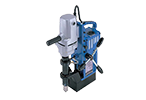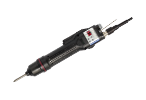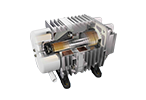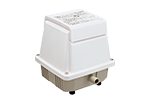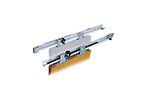Business Continuity Management
Business Continuity Management
Business Continuity Policy
Nitto Kohki has set the following priorities in case of emergency.
(1) Protect the lives of employees and their families.
(2) Maintain the supply of products.
(3) Fulfill our social responsibilities.
Index
1. BCM Structures
Nitto Kohki established the Internal Control Committee as the highest decision-making body regarding internal controls. Subcommittees were established under the Internal Control Committee to address individual areas and risk management systems are effectively operated in accordance with the Internal Control Rules, Compliance Rules, Security Trade Control Rules, Crisis Management Rules, and the rules of individual committees.
In an emergency, a Crisis Response Headquarters is established with the president as its general manager and systems are mobilized to respond rapidly in order to prevent expansion of damage and to minimize losses. Periodic measures are undertaken by the Crisis Management Committee, a subordinate organization of the Crisis Management Headquarters, and by the first response team that performs fire protection control.
2. Crisis Management Team

-For each main Sales Branch – the Osaka Branch, Nagoya Branch, and Fukuoka Sales Branch – the crisis response personnel are appointed. They are responsible for the first response and gathering information in disaster situations at each site.
-The Osaka Branch is prepared to be an alternate crisis Response Team while the headquarters is damaged
3. Measures for Business Continuity
Production
(1) Secure purchasing routes
In preparation for an emergency, Nitto Kohki is working to establish structures that constantly take into consideration alternate routes (cooperating plants).
(2) Backup production systems
The Machine Tools business has three plants in Japan, and the Couplings business and Linear business operate one plant in Japan and one in Thailand. Nitto Kohki is working to establish systems at domestic and overseas plants that will make alternate production possible.
In addition, the three plants in Japan are developing systems for sharing production information and backing up drawings so that they can support one another.
Sales
(3) Maintain the supply of products
If production is suspended, inventories at the logistics centers created by the Osaka Branch and Tochigi Nitto Kohki and inventories maintained by distributors located throughout the country will be used to minimize the risk of running out of inventory.
(4) Sales backup system
Development and operational testing has been completed of a system that will enable the headquarters or the Osaka Branch to perform order taking and placement operations in the case where a sales branch or the headquarters, is damaged.
(5) Sales Branch backup system
Regular Contact Number
Emergency Contact Number
Headquarters
Tel: +81-3-3755-1111;
Fax: +81-3-3754-4131
(Overseas Dept.)
Western Sales Div.
Tel: +81-6-973-5501;
Fax +81-6-978-2125
Western Sales Div.
Tel: +81-6-973-5501;
Fax +81-6-978-2125
Headquarters
Tel: +81-3-3755-1111;
Fax: +81-3-3754-4131
(Overseas Dept.)
Midland Sales Div.
Tel: +81-52-726-9041;
Fax: +81-52-772-7745
The emergency contact locations are ready to address the following matters as substitutes for the regular contact locations.
-Questions concerning the products
-Inventory confirmation
-Order acceptance and shipment confirmation
-Repair requests
Information
(6) Information and data backup system
A system to backup information and data essential for supplying products to customers already exists.
During power outages, the server room operates on an emergency generator, if, however, operations become unfeasible, operations can immediately be switched to a different site for rapid recovery.
Facilities
(7) Facility Preparedness Measures
In preparation for an earthquake, Nitto Kohki is taking measures to minimize damage to structures. In addition to earthquake-proofing structures themselves, reinforcement is being added to fixtures and office equipment is being fixed in place.
4. Employee Training
(1) Disaster drill
The disaster drill is conducted at the headquarters once annually to ensure that employees are able to protect their own lives during and emergency.
In addition to basic evacuation and roll call procedures, employees are trained to make autonomous decisions and take action according to the circumstances such as if they come across an injured person, functioning fire prevention equipment, or if personnel are missing.
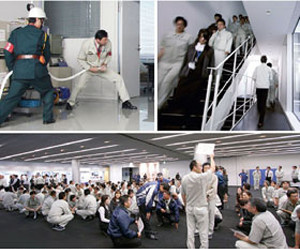
Evacuation Training
(2) Emergency Contact
Means and procedures for contacting employees during an emergency are specified in advance and the ability to contact employees is periodically confirmed.
(3) Lifesaving Training
Once each year, Nitto Kohki holds a training course for employees to acquire lifesaving certification. All employees gain skills with the aim of contributing to local communities.

Lifesaving Training
Approximately 30 employees take the course each year
5. Past Emergencies
(1) Japan
Damage from Great East Japan Earthquake (March 2011) and its responses.
NITTO KOHKI
Damage
Response
-Cracks and protuberances occurred in some structures.
-Documents flew out of cabinets and PCs fell over.
-No employee injuries.
-Protuberances occurred in first and second story landings of structures and some walls cracked, but there was almost no damage.
-The Sendai Branch incurred substantial damage.
-Buildings temporarily evacuated.
-Crisis Response Headquarters established.
Employee safety confirmed using emergency contact lists (including personnel on business trips).
-Status of damage and safety of personnel in affected regions confirmed.
-Crisis Management Committee distributed information to all employees and shared information in a timely manner.
-Relief supplies sent to Shirakawa Nitto Kohki and Sendai Branch.
A Companywide Production Investigation Conference was established to share information on damage to cooperating plants, material procurement, production status, and other matters and to deliberate on countermeasures, and it was possible to supply products.
-Using the sales Branch Backup System, operations were transferred from the damaged Sendai Branch to the headquarters. Sales personnel from other offices served as replacement personnel and efforts were made to minimize the impact on customers.
-Normal operations resumed on April 4.
Domestic Production Sites
Damage
Response
Shelves fell over, windows broke, and essential utilities were cut off.
-No employees or employee family members were injured.
-No abnormalities with machinery that runs on oil or gas.
-Gasoline shortages cause a suspension of logistics operations and employees had trouble getting to work.
-Buildings temporarily evacuated.
-The safety of employees and their families was confirmed.
-Electric power to equipment was cut off to prevent secondary damage.
Gathered information on the damage and reported to the headquarters.
-Relief supplies were sent from Tochigi Nitto Kohki to Medotech and Shirakawa Nitto Kohki.
-Some ceilings collapsed, shelves fell over, and machinery moved, but recovery operations were commenced with all personnel including support from the headquarters.
-Sorting work was performed to determine products that could be shipped to customers and products that could not be shipped.
-Tochigi Nitto Kohki and Medotech resumed production on March 22, and Shirakawa Nitto Kohki resumed production on March 31.
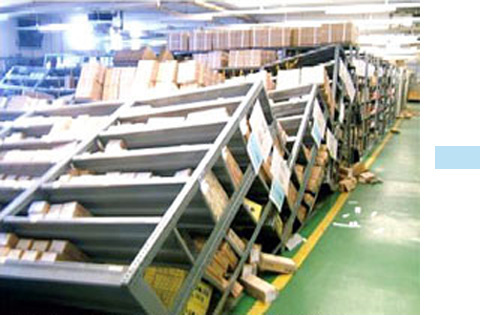
Right after the earthquake: Shelves fell over and products were scattered on the floor
(TOCHIGI NITTO KOHKI)
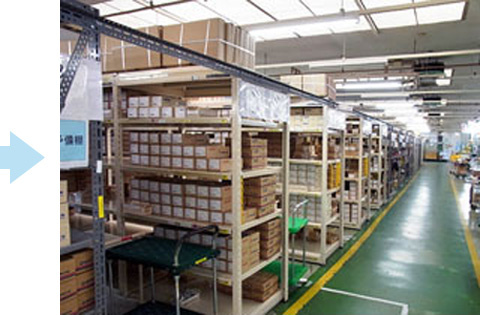
(2) Thailand
Damage from Flooding (October 2011) and its responses.
Damage
Response
-The buildings of Nitto Kohki (Thailand) and Nitto Kohki Coupling (Thailand) were completely flooded, the walls peeled, sludge accumulated, and all machine tools assembly equipment, and measuring instruments were rendered unusable. The floodwater contained sewage, chemicals, oil, and other substances, and as a result, a foul odor was emitted even after the dirty water receded.
-Operations were suspended.
-December, 2011: Tochigi Nitto Kohki began alternate production.
-February, 2012: Tochigi Nitto Kohki accepted 15 experienced employees from Nitto Kohki (Thailand) and began full-scale alternate production.
-January, 2013: In consideration of the risk of flooding, Nitto Kohki (Thailand) and Nitto Kohki Coupling (Thailand) built new two-story structures with the first story 2 additional meters above the ground.
-April, 2013: Nitto Kohki (Thailand) and Nitto Kohki Coupling (Thailand) merged, forming Nitto Kohki Industry (Thailand), a production subsidiary for linear compressors and rapid-flow couplings.
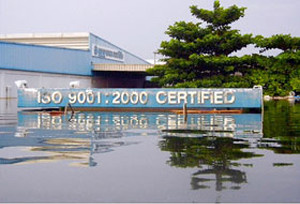
October, 2011
Nitto Kohki (Thailand) and Nitto Kohki Coupling (Thailand) were flooded almost to the ceiling
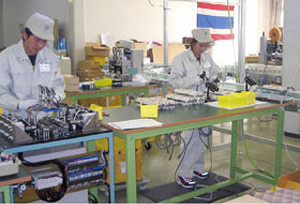
February, 2012
Tochigi Nitto Kohki welcomed Thai employees and conducted alternate production through full mobilization of its workforce.
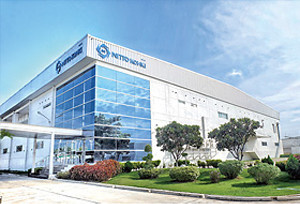
April, 2013
Nitto Kohki Industry (Thailand) established



